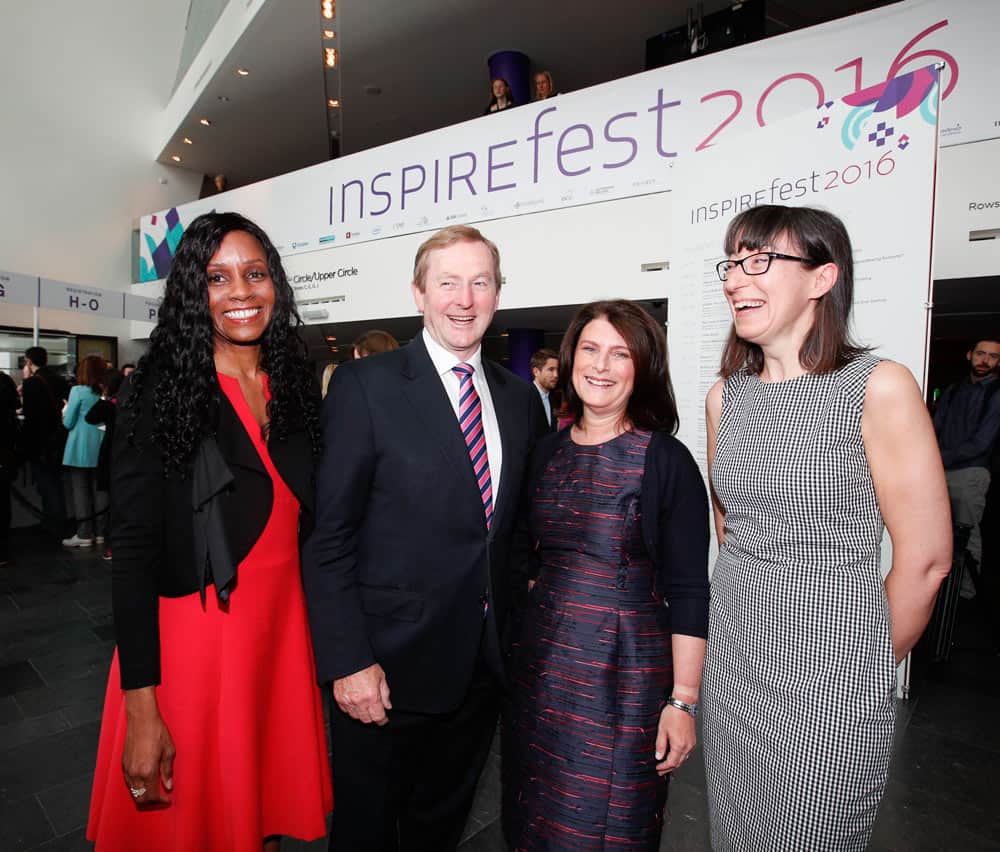Events like Inspirefest are helping to change perceptions in relation to women in STEM. Pictured at this year’s event (L-R): Judith Williams (Dropbox), An Taoiseach Enda Kenny, Ellyn Shook (Accenture) and Ann O’Dea (Silicon Republic)
By Diane Baker, senior manager, Berkley
In Ireland, women make up just one-quarter of people working in science, technology, engineering and maths (STEM) sectors and just 17% of entrants into third-level IT courses in Ireland are female.
The lack of females engaged in STEM roles isn’t limited to a particular generation. In fact, just 17% of entrants into third-level IT courses in Ireland are female.
But just why is it that so few women enter into STEM-related careers? The answer seems to lie in the ongoing, prevailing stigmas that deter young girls from ill-perceived ‘boy’ subjects.
Just last year a survey of 1,500 Irish girls, aged 11 to 18, and 2,500 young Irish women, aged 19 to 23 found that half felt STEM subjects were more suited to males. The results were reinforced by this year’s Central Statistics Office announcement that less than 25% of STEM jobs are filled by women in Ireland.
ATTITUDE SHIFT
I strongly believe that investment in early years will really help us combat this imbalance. There’s so much more that can be done.
Encouragement and a shift in attitudes in the education sector are the first steps forward; teachers need to be armed with the right materials and guidance to ensure STEM subjects are inclusive from the first day of school right through to when pupils receive their Leaving Certificate.
Once the education system has addressed this, we can gather further momentum by fusing the efforts of the academic and corporate worlds; they need to work more closely to identify how cooperation and investment can help address skills gaps on every level.
Ireland is renowned for its forward-thinking, open-minded outlook, and this inequality lets us down; I’m urging decision-makers in education to address this imbalance sooner rather than later, or see us falling behind in the future
Primarily, by creating initiatives in school and workplace training opportunities we can encourage more young women and girls to consider subjects they don’t see as conventional routes.
Getting more women into these roles is not only a huge step forward for gender diversity in Irish businesses, but it also addresses the economic arguments for bringing women into STEM sectors.
Just a year ago McKinsey’s global research into diversity suggested €10.9tn could be added to global GDP by 2025 by advancing women’s equality – a hugely significant figure.
ADDRESS THE IMBALANCE
In order for Ireland to remain competitive and continue to be a player on the world’s stage, it is important that the make-up of its workforce appropriately reflects that of society.
Furthermore, by studying STEM subjects, girls will be more prepared for the workforce, even if they don’t pursue a career directly related to one of these fields.
To paraphrase the comments of professor Mark Ferguson of Science Foundation Ireland this year, ‘A science education helps to garner much-needed decision-making skills that can be applied to many career-paths.’
Ireland is renowned for its forward-thinking, open-minded outlook, and this inequality lets us down; I’m urging decision-makers in education to address this imbalance sooner rather than later, or see us falling behind in the future.
About the blogger
She joined The Berkley Group in 2007, a cross-discipline recruitment specialist based in Cork, which became part of The Rethink Group in 2011.
As senior manager, Client Development, Diane sits on the senior management team, working with new and existing clients to provide the most efficient and cost-effective talent solutions to organisations across multiple industries.

